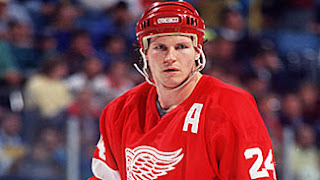 After suffering numerous hits in
the NHL, Paul Kariya was forced to retire following the 2010-2011 with
post-concussion symptoms. Kariya retired after 15 seasons in the NHL as a point
per game player. While Kariya has accomplished great things as an undersized
hockey player, he will always be remembered for the injuries he suffered during
his career. Kariya suffered numerous concussions in his career; as well as, two
brain injuries from 1996 to 1998 from dirty hits.
After suffering numerous hits in
the NHL, Paul Kariya was forced to retire following the 2010-2011 with
post-concussion symptoms. Kariya retired after 15 seasons in the NHL as a point
per game player. While Kariya has accomplished great things as an undersized
hockey player, he will always be remembered for the injuries he suffered during
his career. Kariya suffered numerous concussions in his career; as well as, two
brain injuries from 1996 to 1998 from dirty hits.
Kariya was selected third overall
by the Anaheim Mighty Ducks, during the 1993 NHL Draft. He scored more than 50
goals during the 1995-1996 season, and scored more than 40 on two other
occasions. Kariya will always be remembered as the captain of the Ducks and the
face of that franchise for over nine seasons.
A player that dazzled many with
his natural talent and faster than light speed, Kariya registered 989 points in
989 NHL games. All the speed in the world couldn’t prevent Kariya from
connecting with Scott Stevens during the 2002-2003 Stanley Cup Finals. Kariya
was flattened by Stevens in open ice, leading him to lay on the ice motionless
for several minutes before being assisted off by the training and coaching
staff. After leaving Anaheim to play for Colorado, St. Louis, and Nashville
Kariya’s career was never the same. While Kariya is finally symptom free after
15 years in the NHL, he is still a strong advocate for concussion awareness.
Kariya believes that players suffering concussions should re-habilitate
themselves fully before returning to the ice. A player with amazing skill, and
blazing speed was never the same after suffering this injury, showing readers
how serious concussions can be.





